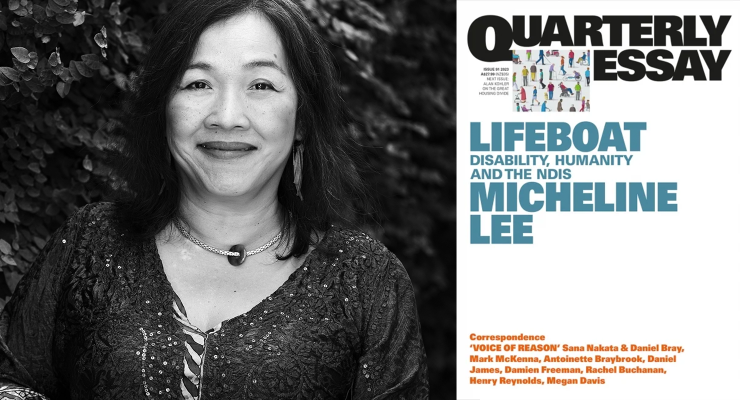
The National Disability Insurance Scheme (NDIS) was born from the need to meet the most private of disabled people’s needs, without which we don’t have any chance of being part of the community. But the NDIS wasn’t meant to be just about these deeply personal parts of our lives — it was also intended to liberate disabled people from being excluded. Has that happened?
The latest Quarterly Essay — Lifeboat: Disability, Humanity and the NDIS — is a timely and personal look at the NDIS from writer Micheline Lee. Using her own experiences and expertise as a disabled person, she examines the Australian government scheme and asks if it has delivered on the hopes invested in it.
Lee begins with an anecdote familiar to most disabled people: one about exclusion, about being treated as different, about the barriers in the world to our equality. As she notes, “What many people don’t see is the bigger issue: discriminatory attitudes and society’s unwillingness to meet the needs of disabled people”. Indeed.
Her experiences were detailed in an earlier essay for The Monthly in 2017, which explored the frustrations of trying to get the support that we disabled people need to live our lives. Lee ended that article with the hope that the NDIS could mean that “the structures and the attitudes that disadvantage people with disabilities can be transformed”.
In Lifeboat, the writer traces her life through mainstream education, sitting away from her classmates, watching them play in places she couldn’t reach. Her friendship with another disabled person weaves throughout the essay — different disabilities, different personal impacts, but the same exclusion. This power in solidarity with other disabled people is clear, as is the heartbreak.
Perhaps it is our similar age, but I, like Lee, struggled with seeing myself as disabled when I was younger. I also thought that “disability was something I had to overcome”, fearing that reliance on others as my body changed. That fear, for both of us, came from very good reasons. At the time, there were few examples of disability supports delivered with anything other than indignity, waiting lists and charity.
Lee traces her own experiences with disability supports before the NDIS, which weren’t even close to what she needed. She finally received two hours of support in the mornings before work, but more aid wasn’t available “until someone else vacated their place in the scheme”. This was a common experience — little to no assistance and inconsistent eligibility rules between different states, or even local government areas, and between different kinds of disability.
This lack of support wasn’t accidental; it’s the end result of centuries of seeing disabled people as unequal, as wrong, as not really human. Lee talks about how “from my Chinese-Malaysian background, I was seen as a result of a curse of a contamination to my lineage”. She includes the eugenics movement, active in Australia along with many other places, which saw “disability as a defect, which needed cure or elimination”.
The rise of the disability rights movement — including the development of the social model of disability that tried to build a framework for solidarity among disabled people with many different kinds of disabilities — established a new way of thinking about disabled people, led by disabled people. Here the problem with disability wasn’t as much about our own impaired bodies and minds but about the barriers and exclusions in the world around us. This means to include us, the barriers must be torn down, instead of focusing on changing us as disabled people.
Lee elegantly goes through the history of the NDIS and the original promises it made. Choice and control, reasonable and necessary — what these terms mean and why they are important. But she also asks, “Could the NDIS really create a more caring and inclusive society?”
It’s a good question. Part of the answer is about what went before — disabled people fighting to be in control of our lives, of our supports, of the systems and policies that are about us. Lee looks at the changes to the NDIS, the infiltration of non-disabled people from banking and the corporate sector, saying the “experiential knowledge of disabled people was devalued”.
Through interviews with other disabled people and their families, Lee asks questions about the market system of the NDIS and whether it has delivered the promised power to disabled consumers. She writes, “We did not sign up to a scheme where an individual is left to sink if they don’t fit the image of the ideal consumer”, and wonders why the kinds of individualised funding schemes in other countries that use public service delivery haven’t happened here.
Lee finds that “providers have raised their prices, taking advantage of situations where there is more demand than supply”, which echoes the findings of the current NDIS review.
The essay ends with a clarion call for disabled people to once more be in charge of what happens next with the NDIS, rather than those who scaremonger “about the cost of the scheme, although they themselves have amplified these by cutting short-term costs so the scheme can’t flourish, neglecting disability supports outside the NDIS and implementing a market model that’s not fit for purpose”.
The current NDIS review, with thousands of disabled people contributing ideas for change, must have its recommendations led by us, or this opportunity to deliver on the promise of the scheme will be squandered. Lee’s elegant, honest and searing indictment of non-disabled people’s failures, and its acknowledgement of disabled people’s determination, must be heard.
Have you dealt with the NDIS? Let us know what your experience has been, and what if anything you’d like to see change, by writing to letters@crikey.com.au. Please include your full name to be considered for publication. We reserve the right to edit for length and clarity.








get rid of every third party middle man ; like the NDIS funding – indeed all social security payments are not there to provide so called business for profiteers in suits, shuffling their cut out of our finite pie ; note the pirates in childcare, body corporates born of public infrastructure payments ; agedcare , our once public parking and tunnel road links ; lazy or corrupt and inane politicians with their predominate focus on announcements and lies “Conversations”
public enquiries giving lobbyland and pundits in tourism and marketing soap boxes on our ABC ( run like netflix increasingly dumbed diwn with cheap hollow appropriating ; achieving zip except abuse ; gaslighting older progressive voiceless people; seasoned women who are being indentured into lowly indentured free silo kabor for middlenen pretending they are supporting precarity – nup
It sounds like this is another group that needs a Voice…
Disabled people have always had a Voice, the problem is the lack of those who will listen!
My son had his review in past months. We learned information at his phone interview that we’d not had before. Useful information.
So he’s got he new plan and updated funding, since part of it was running short and he had to drop some sessions with one of his providers to eek it out for the last six months of the previous plan. That’s another difficulty with the NDIS. Funds are allocated to certain ‘budgets’ within the plan and in some cases unused funding available in other parts of the plan can’t be shifted to cover shortfalls elsewhere in the plan.
He’s been allocated funding towards a plan co-ordinator. However, none are local and if they arrange something, from their own resources, and have some one travel, that’s yet another cost that’s not always made clear and the plans don’t necessarily allow for travel costs by service providers especially given that we live rural, so travel costs can add up.
I’m also aware of plan co-ordinators, even after discussing what services a recipient would like, don’t necessarily find services that suit (they don’t necessarily Listen, they simply decide what they think will work) and the only option for recipients is to continue with a service they don’t like, or stop using the service and have the money sit there not being used.
So the real problem is, not that they don’t have a voice, they just need people to actually LISTEN, not just HEAR. There is a difference.